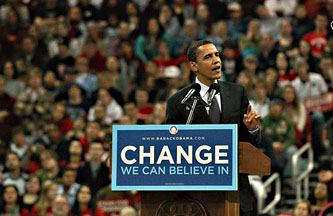 The expected Republican victory tomorrow, according to Jeb Bush, isn’t so much an endorsement of the Republican Party as it is a “repudiation of the massive overreach” engineered by Barack Obama over the past two years. Is he right?
The expected Republican victory tomorrow, according to Jeb Bush, isn’t so much an endorsement of the Republican Party as it is a “repudiation of the massive overreach” engineered by Barack Obama over the past two years. Is he right?
There’s something to this, but I think you have to take a step back to understand it properly. I don’t know enough about world history to say if this is broadly true, but in America at least, liberal progress over the past century has come in a series of very short bursts. The Progressive Era, the New Deal, and the Sixties all produced the bulk of their reforms over the space of about half a dozen years, after which an exhausted public largely called a stop. The Progressive Era ended with World War I and the 19th Amendment and was followed by the business-centric “normalcy” of the Harding-Coolidge years. The New Deal came to a close with the start of World War II, and it was followed first by Harry Truman’s inability to move the chains much on further domestic reform and then the Cold War conservatism of the Eisenhower era. Likewise, the famously massive changes of the Sixties were followed by the equally famous backlash of the 70s and the election of Ronald Reagan.
So repudiation of liberal reform is entirely normal. The big question is: why did Obama only get two years? Especially considering that his reforms, compared to previous eras of liberal activism, were so modest?
Let’s take a few guesses. (1) Obama’s goals themselves were comparatively modest, and that set expectations. Burnout among the electorate may be as much relative to expectations as it is a reaction to absolute measures of change. (2) The internet and the 24/7 media environment have speeded things up. What goes up must come down, but attention spans are so short these days that things come down a lot faster than they used to. (3) On a related note, the congressional environment is more poisonous than in the past, and voters may be reacting to that as much as they’re reacting to Obama’s actual legislative agenda. (4) The economy sucks. People get frustrated with change a lot faster in bad times than in good.
But there’s also one other thing: the backlash against Obama probably isn’t all that strong to begin with. As I mentioned on Friday, basic structural factors suggest a Democratic loss of 45 seats in the House this year. If Democrats instead lose 55, that’s evidence of a backlash, but not actually a very big one. It means that we’re still fundamentally the 50-50 nation we all talked about so much after the 2000 election, and a small shift among a small number of voters makes a big difference. It’s true that voters are frustrated and tired, but I think it’s a mistake to allow TV shoutfests to exaggerate just how frustrated and tired they really are.













